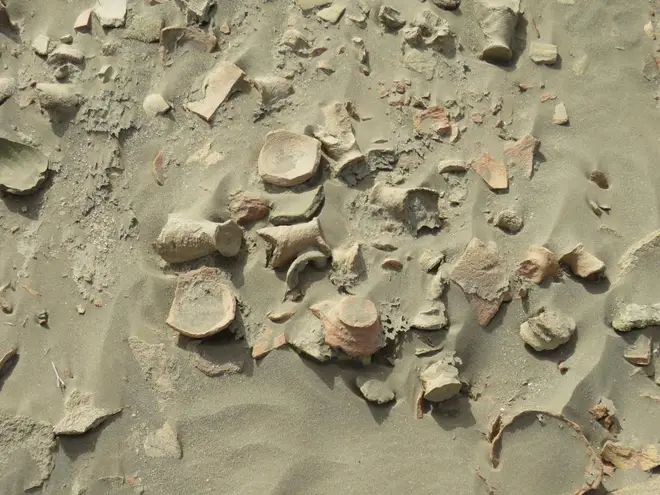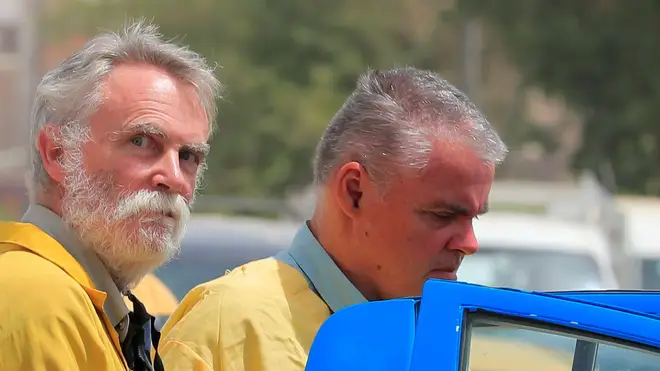
Oli Dugmore 4am - 7am
9 June 2022, 20:40 | Updated: 10 June 2022, 00:19

Son-in-law of British geologist jailed in Iraq Sam Tasker
The son-in-law of 66-year old Jim Fitton, who has been sentenced to 15 years in an Iraqi prison for 'stealing' antiquities, has told LBC his prison term is "worse than a death sentence".
Sam Tasker told LBC's Tom Swarbrick the jail term was a "slow, agonising version of the death penalty" because of the likelihood Mr Fitton would die in prison.
"There's a very low chance that Jim will survive [his sentence]," said Mr Tasker.
"Very low... he would be 81 years old when he gets released from prison if this sentence is passed."
Read more: Retired British geologist jailed for 15 years in Iraq for smuggling artefacts
Read more: British geologist risks facing death penalty 'for smuggling Iraqi artefacts'
Mr Tasker said that the Government had been "quietly lobbied" to avoid the death penalty, but instead his father-in-law had been handed "a slow, agonising version of the death penalty".
"We never get to see him again, we barely get to speak to him, and he suffers for 15 years in what I understand are very, very grim conditions in prison in Iraq," he said.
"It's tantamount to a death sentence, if anything it's worse because the whole thing just sort of elongates the timeframe of which that death sentence is carried out."

Mr Tasker said his father-in-law had been "very excited" about his trip to Iraq and had been planning it throughout the Covid pandemic.
On the day he was due to return to the UK he sent a message to his family explaining there had been an "issue with customs" and would be held up for a few days.
Mr Tasker said his family believed he was capable of dealing with the situation, and it was not until around 10 days later that they began to get worried and called the Foreign, Commonwealth and Development Office (FDCO).
"He was in custody for over two weeks before we, or indeed he, sort of realised the severity of what was happening," he said.

'He'll be 81-years-old when he gets released.'
Mr Tasker said they had had limited communication with him in the past few months - partly because of his father-in-law's desire to "spare" the family from the reality of his situation.
"His main concern even now is to stop us from worrying, so he's limiting the amount of information that he's giving us intentionally about his day-to-day situation," he said.

Mr Fitton, a retired geologist from Bath, was jailed for 15 years on June 6 after he picked up 12 stones and shards of broken pottery during a visit to Iraq.
Authorities said they could be considered archaeological pieces because they date back more than 200 years.
Mr Fitton was arrested in March alongside a German tourist called Volker Waldmann, after airport security found the items in their luggage.
German tourist Mr Waldmann was found not to have criminal intent in the case, and will be released.

Son-in-law of geologist Jim Fitton explains how he avoided execution
Mr Tasker said the reason Mr Waldmann was released because of a "simple" distinction.
"It's to do with who picked the pieces up off the ground in the first instance," he said.
"So Jim picked up, we understand, 12 pieces of this debris off the floor and later gave two of those pieces to the German chap Volker, a gift for himself to take home as a souvenir... that's the only difference between the two cases."
Because of this the court argument was over whether Mr Fitton had intention to steal, something Mr Tasker said he did not.
He said the items were pieces of "worthless debris" with no significant economic, cultural or historical value, and said Mr Fitton had been told by a guide that he was permitted to take them.
"In court the judge stated that he accepted that Jim had no criminal intent and indeed that he didn't even know that what he was doing was a crime, and yet in the same breath sentenced him to 15 years in jail," said Mr Tasker.

Mr Fitton’s sentence appeared to have shocked those in the court, including his defence lawyer who later said he thought his client would get a year-long suspended sentence.
But Judge Jabir Abd Jabir found that by picking up the items and intending to transport them out of the country, Mr Fitton had criminal intent to smuggle them.

Mr Tasker previously said the jail term left him and his family "shattered" and "heartbroken".
He added Mr Fitton's crime was "trivial and dubious" and said his father-in-law did not realise he had committed it.
He also hit out at the UK Government's response, saying: "We are disappointed, indeed stunned, at our own Government's total lack of action in this case to date.
"We are raising an appeal and will continue to fight for Jim's freedom, and urge the Government to support us in every way possible and to open lines of communication with us at a senior level."
On Thursday Mr Tasker reiterated his criticism, saying his father-in-law had "effectively been left hung out to dry" by the UK Government.
"The last thing we want is for Jim to be the victim of a political manoeuvrings within Iraq," he said.
"As far as we're concerned he's completely innocent of all charges."

On the day of the sentencing, Liberal Democrat MP for Bath Wera Hobhouse said: "This is clearly a devastating outcome for Jim and his family.
"There is now no other option but for the Foreign Secretary to intervene at a ministerial level.
"The Foreign Secretary must make representations to the Iraqi government.
"This is yet another example of the British Government presiding over a case of a British national in trouble abroad and they have failed to take action."
Ms Hobhouse is expected to raise the case as a matter of urgency.

An FCDO spokesperson said: "We are providing consular assistance to a British national in Iraq, and continue to support his family.
"We are in contact with the local authorities."
The spokesperson added they had been in contact with Mr Fitton's family "very recently" and that the case had been raised with the Iraqi authorities, but said they were unable to "interfere" with the legal system in other countries.